九年级英语全册Unit3Teenagersshouldbeallowedtochoosetheirownclothes(第4课时)教案人教新目标版
人教版九年级英语unit3知识点,单词讲解
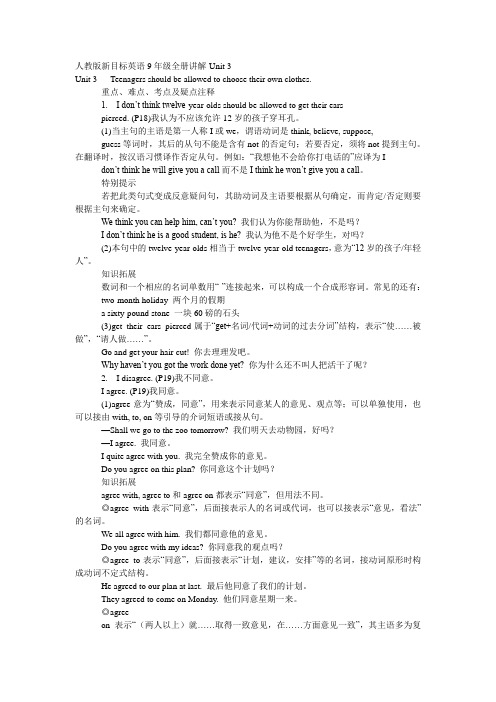
人教版新目标英语9年级全册讲解-Unit 3Unit 3 Teenagers should be allowed to choose their own clothes.重点、难点、考点及疑点注释1. I don’t think twelve-year-olds should be allowed to get their earspierced. (P18)我认为不应该允许12岁的孩子穿耳孔。
(1)当主句的主语是第一人称I或we,谓语动词是think, believe, suppose,guess等词时,其后的从句不能是含有not的否定句;若要否定,须将not提到主句。
在翻译时,按汉语习惯译作否定从句。
例如:“我想他不会给你打电话的”应译为I don’t think he will give you a call而不是I think he won’t give you a call。
特别提示若把此类句式变成反意疑问句,其助动词及主语要根据从句确定,而肯定/否定则要根据主句来确定。
We think you can help him, can’t you? 我们认为你能帮助他,不是吗?I don’t think he is a good student, is he? 我认为他不是个好学生,对吗?(2)本句中的twelve-year-olds相当于twelve-year-old teenagers,意为“12岁的孩子/年轻人”。
知识拓展数词和一个相应的名词单数用“-”连接起来,可以构成一个合成形容词。
常见的还有:two-month holiday 两个月的假期a sixty-pound stone 一块60磅的石头(3)get their ears pierced属于“get+名词/代词+动词的过去分词”结构,表示“使……被做”,“请人做……”。
Go and get your hair cut! 你去理理发吧。
九年级上册单词巧记 句型语法剖析(Unit 3 Teenagers should be allowed to c
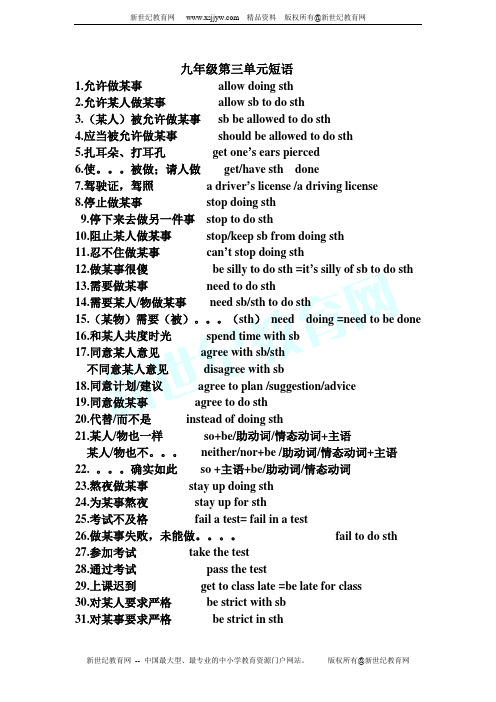
九年级第三单元短语1.允许做某事allow doing sth2.允许某人做某事allow sb to do sth3.(某人)被允许做某事sb be allowed to do sth4.应当被允许做某事should be allowed to do sth5.扎耳朵、打耳孔get one’s ears pierced6.使。
被做;请人做get/have sth done7.驾驶证,驾照 a driver’s license /a driving license8.停止做某事stop doing sth9.停下来去做另一件事stop to do sth10.阻止某人做某事stop/keep sb from doing sth11.忍不住做某事can’t stop doing sth12.做某事很傻be silly to do sth =it’s silly of sb to do sth13.需要做某事need to do sth14.需要某人/物做某事need sb/sth to do sth15.(某物)需要(被)。
(sth)need doing =need to be done16.和某人共度时光spend time with sb17.同意某人意见agree with sb/sth不同意某人意见disagree with sb18.同意计划/建议agree to plan /suggestion/advice19.同意做某事agree to do sth20.代替/而不是instead of doing sth21.某人/物也一样so+be/助动词/情态动词+主语某人/物也不。
neither/nor+be /助动词/情态动词+主语22. 。
确实如此so +主语+be/助动词/情态动词23.熬夜做某事stay up doing sth24.为某事熬夜stay up for sth25.考试不及格fail a test= fail in a test26.做某事失败,未能做。
Unit_3_Teenagers_should_be_allowed_to_choose_their_own_clothes
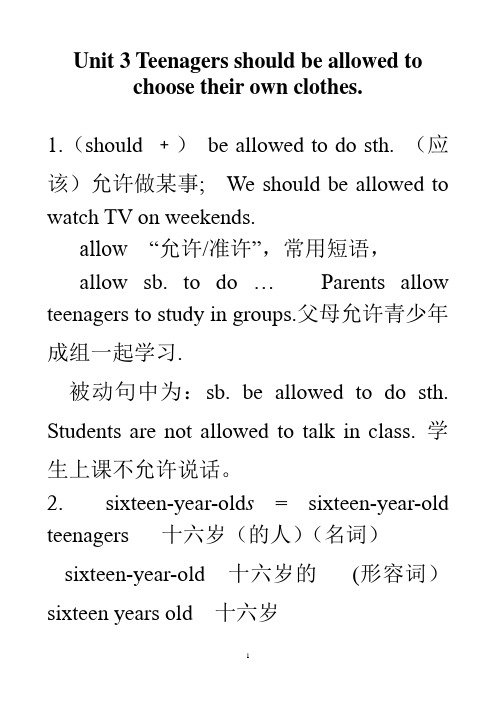
Unit 3 Teenagers should be allowed tochoose their own clothes.1.(should ﹢)be allowed to do sth. (应该)允许做某事; We should be allowed to watch TV on weekends.allow “允许/准许”,常用短语,allow sb. to do …Parents allow teenagers to study in groups.父母允许青少年成组一起学习.被动句中为:sb. be allowed to do sth. Students are not allowed to talk in class. 学生上课不允许说话。
2. sixteen-year-old s= sixteen-year-old teenagers 十六岁(的人)(名词)sixteen-year-old十六岁的(形容词)sixteen years old 十六岁The boy is five years old. = He is a five-year-old boy.3.o wn pron. & adj. 自己的I have my own bedroom.v. 拥有,占有This book is mine. I own it.owner n. 物主,主人Who is the owner of the house.4.(足)够…… enough +名词enough people/water/time/money形容词/副词+enough big/tall/serious enough5. stop to do…停下来去干……He stops to have a rest.stop doing… 停止(不准)干……Please stop talking.stop sb. from doing sth. 阻止某人做某事5. He doesn‟t seem to have many friends.= It seems that he doesn‟t have manyfriends. 他看起来没有很多朋友.6. He needs time to do homework. 他需要时间做作业. need (sth.) to do sth. They need money to buy food.need sth. We all need air and water.sth.doing sth. The bike needs repairing. = The bike needs to be repaired. (主动表被动)7. They talk instead of doing homework. = They don‟t do homework. They talk. 他们谈话,没有做作业.instead of +名词/代词They go to the movies instead of their parents.+动名词(doing) He sang a song instead of telling a story.8. a lot of =lots of 许(很)多/大量的(可/不可数名词)many(可数名词)much (不可数名词)9. So do we. 我们家也是(有). He runs so fast. So does his brother.1) 用副词too 多用于口语,句末, 肯定句/问句.either多用于口语,句末, 否定句表“……也一样”also 多用正式文体, 句中近动词, 各句型.2)用倒装陈述部分肯定用“so+谓动+ 主语”陈述部分否定用“nor/neither+谓动+主语”注意:so+主语+助动词/情态动词/系动词be”,表示赞同某人的看法,意为“是啊,确实如此”--- Lily sings well. --- So she does. ---Lily唱得好。
九年级英语全册《Unit 3 Teenagers should be allowed to choo
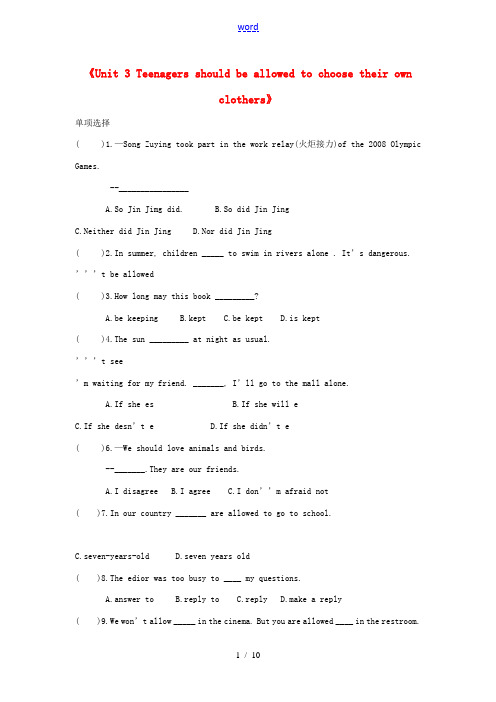
《Unit 3 Teenagers should be allowed to choose their ownclothers》单项选择( )1.—Song Zuying took part in the work relay(火炬接力)of the 2008 Olympic Games.--________________A.So Jin Jimg did.B.So did Jin JingC.Neither did Jin JingD.Nor did Jin Jing( )2.In summer, children _____ to swim in rivers alone . It’s dangerous. ’’’t be allowed( )3.How long may this book _________?A.be keepingB.keptC.be keptD.is kept( )4.The sun _________ at night as usual.’’’t see’m waiting for my friend. _______, I’ll go to the mall alone.A.If she esB.If she will eC.If she desn’t eD.If she didn’t e( )6.—We should love animals and birds.--_______.They are our friends.A.I disagreeB.I agreeC.I don’’m afraid not( )7.In our country _______ are allowed to go to school.C.seven-years-oldD.seven years old( )8.The edior was too busy to ____ my questions.A.answer toB.reply toC.replyD.make a reply( )9.We won’t allow _____ in the cinema. But you are allowed ____ in the restroom.A.smoke; smokingB.to smoke ; to smokeC.smoking; to smokeD.to smoke; smoking’t _____ too late, or you’ll feel tired in tomorrow’s classes.A.wake upB.stay upC.get upD.give up( )11.—I used to go out for a walk after supper.--_______________.A.So do IB.So did IC.So can ID.So am I.( )12.—What should we do first if we want to develop our village ?--A lot of new roads_____, I think.A.have to buildB.must buildC.must be builtD.have built( )13.I must get my breakfast ______ now.’t worry . He is _____ to look after little Betty.A.carefully enoughB.enough carefulC.careful enoughD.enough carefully( )15.What did you use to do ______ my age ?A.atB.inC.withD.to二.完形填空After the Second World War, there were many reports of mysterious(神秘的)“flying saucers(碟子)”.They 1 throughout the world.For quite a long time strange shapes had been reported in 2 parts of the world,but it was not until recent times that these were seriously studied . Pictures and films 3 of flying saucers, or UFOs seen in the sky . Some pilots of 4 reported that round flying machines had flollowd 5 , and moved at great speeds. Some unofficial (非官方的)experts and 6 suggested that some creatures(生物)from other planets were watching us. Some reports said a UFO had 7 the earth. A space creature 8 the UFO and moved around , then flew of again. But none of the landings was ever proved(被证实) to be true.What lies ahead of us (我们的前景如何)?We do not know. 9 we can be sure that whatever happens, we are living in an age which will grow streadily(稳定地) 10 .( )3.A.take B.took C.were taking D.were taken( )4.A.planes( )7.A.was B.left C.arrived nded on( )9.A.And B.But C.Or D.So( )10.A.interesting B.interested C.more interesting D.more interested 三.阅读理解A:Who Influences Teenagers?“Teenager” means people from 13 to 19 years old. Although they’re young, they have to make many important choices by themselves. They need to think about questions like these.Should I go to college ? What kind of jobs do I want ? However, other people also influence their choices . Who influences Teenagers ? Teenagers were asked this question and here’s what they said.It depends on the kind of choice . When teenagers buy things , friends are the most important influence. This is especially true for clothes and music. TV shows, advertiserments(广告)and parents also influence teenagers. In more serious things, parents are probably the most important influence. Some teenagers say it’s best to regard both parents and friends as influences. James, a seventeen-year-old boy says he’s “Just a crazy man”. He also says , “Parents are really important because they can tell you what’s right and wrong.”But teenagers also feel they need to make choices to make their own mistakes.As one teenage girl said, “If our parents don’t let us make our own choices, maybe in the future we won’t know how to do it .” And they feel friends can often be a big help, especially because friends sometimes know more about their situation(处境)than their parents do.Do you depend parents or others when you decide what to do and how to do it ? whoever(无论谁)you depend on ,the correct choice is the most important. Your future is in your hand.根据短文内容,判断正(T)误(F)( )1.When teenagers buy clothes and music, friends are the most important influence.( )2.People from 13 to 19 can be called “teenagers”.( ) shows and advertisements can’t influence teenagers.( )4.Sometimes friends know more about teenagers’situation than their parents.( )5.In more serious things , friends are probably the most important influence. BA DiscussionHost: Hello! I’m Gavin from All Talk 970FM.Wele to our program. Today our topic is part-time jobs. Are they good for school children or not?Headmaster(校长):Certainly not. Children have got two full-time jobs already: growing up and going to school. Part-time jobs make them so tired that they fall asleep in class.Mrs Smith: I agree. I know school hours are short, but there’s homework too. And children need a lot of stay at school until they’re eighteen or nineteen. A part-time job can’t harm(伤害)them. In fact, it’s good for them. They themselves make their pocket money . And they see something of the world outside school.Business man:You’re quite right. Boys learn a lot from a part-time job.And wemustn’t forget that some families need the extra(额外的)money. If the students don’t take part-time jobs , they can’t stay at school.Host: Well, we have got two for , and two agaist . What do our listeners think ? ( )1.How many guests join the discussion ?( )2.Who have the same idea ?A.Mr and Mrs Smith .B.The host and Mrs Smith.C.the headmaster and businessmanD.The businessman and Mr Smith( )3.Mrs Smith thinks that children ________.A.need enough sleepB.need the extra moneyC.should see something of the World outside schoolD.should stay at school until they’re eighteen or nineteen( )4.What do the children think of part-time jobs ?A.We are not told in this passageB.Part-time jobs are good for themC.Part-time jobs aren’t good for their studies.D.Part-time jobs can help the students from poor families.( )5.Where is the discussion most probably from ?A.A TV stationB.A radio stationC.A newspaperD.A magazzine.CStrong Man Swimming Club Rules1.All swimmers must take a shower before they go into the pool.2.Diving is only allowed from the diving-board.3.Running and playing near the pool is not allowed.4.Club members may bring guests at the weekends only.5.Children under 12 are not allowed to use the pool unless they are with an adult.6.Members must show their membership cards at the front reception desk.ed towels must be placed in the bins provided.8.Smoking is not allowed in the changing-room.9.Guests must sign at the front reception desk.10.Only club members and their families are allowed to use the pool.( )1.Diving is allowed from _____A.everywhereB.right side of the poolC.the diving-boardD.the gate ( )2.When are guests allowed to e ?A.FridayB.SaturdayC.Any dayD.After 6:00 pm.( )3.What must club members bring with them ?A.Towels.B.Keys.C.Swimming caps.D.Membership cards.( )4.If club members bring guests there, what should the guests do ?A.NothingB.Bring ID cardsC.Sing at the front desk( )5.Who are allowed to use the pool?A.AnyoneB.Onlyclub membersC.Only guestsD.Club members and their familiesDIn a classroom in any countries, the teacher teaches more than art or history language. He or she teachers something behind the culture(文化)of the country. In a country such as the United States, people with different histories, cultures and languages join together and they pay much attention to personal ideas. Teachers try to make each student special. Students do not have to remember a lot of information, instead, they work and find answers by themselves. There is often discussion in the classroom.At an early age students learn to have their own ideas. Their education encourages personal thought(思想).The important is placed on how to arrive at an answer and not only to get the correct answer.In most Asian countries, people have the same language, history and culture. Perhaps for this reason, the education there pays more attention to group goals than personal ideas. Children in China and Japan often work together and help each otheron homework. In the classroom, the ways of teaching are often very traditional. The teacher says , and the students listen. There is not much discussion. Instead, the students repeat(重复)rules or information that they have been taught in order to keep than in mind.In many ways there differences e from different educational ideas. In Western countries teachers are taught students to learn by themselves. In some Asian countries, however, teachers often feel that their job is to pass knowledge to students.回答问题1.Do students in the United States have to remember a lot of information ?2.There is often discussion in the classroom in America , isn’t there ?3.What does the education in the United States encourage ?4.Which does the education is some Asian countries pay more attention to , group goals or personal ideas ?5.Put the sentence “In some Asian countries, however, teachers often feel that their job is to pass knowledge to students.”into Chinese.四.词语运用。
九年级上英语 unit 3 Teenagers should be allowed to choose their own clothes.
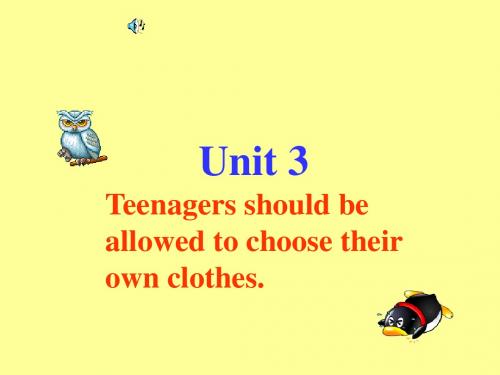
3. Students should not be allowed to go out at night.
4. Students should not be allowed to take part-time jobs .
3. Students should not be allowed to get their ears pierced.
一般现在时: am/is/ are +动词的过去分词 一般过去时: was/were +动词的过去分词
seem 似乎是,好象是 It seems/seemed that +从句 It seems that he is very lonely. He seems to be lonely. It seems that they are friends.
Tony didn’t , either.
neither did Tony.
He wasn’t a doctor , they were not ,either. neither were they.
Tim works hard, so he does. She is a doctor, so she is. He can play the guitar, so she can. So表示强调,主语确实如此。
My sister washed the clothes。 The clothes were washed by my sister. The teacher asked him to the office。 He was asked by the teacher to the office.
My parents allow me to watch TV. I am allowed to watch TV by my parents. He does his homework every day. His homework is done by him every day.
九年级Unit 3 Teenagers should be allowed to choose their own clothes.的语法知识点
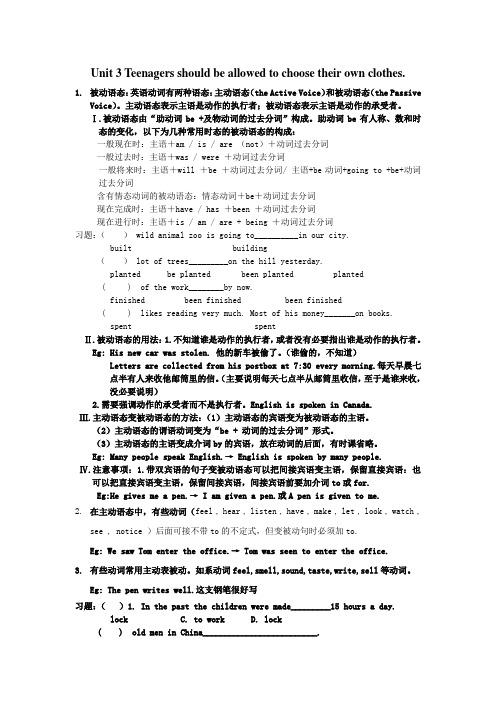
Unit 3 Teenagers should be allowed to choose their own clothes.1.被动语态:英语动词有两种语态:主动语态(the Active Voice)和被动语态(the PassiveVoice)。
主动语态表示主语是动作的执行者;被动语态表示主语是动作的承受者。
Ⅰ.被动语态由“助动词be +及物动词的过去分词”构成。
助动词be有人称、数和时态的变化,以下为几种常用时态的被动语态的构成:一般现在时:主语+am / is / are (not)+动词过去分词一般过去时:主语+was / were +动词过去分词一般将来时:主语+will +be +动词过去分词/ 主语+be动词+going to +be+动词过去分词含有情态动词的被动语态:情态动词+be+动词过去分词现在完成时:主语+have / has +been +动词过去分词现在进行时:主语+is / am / are + being +动词过去分词习题:() wild animal zoo is going to__________in our city.built building() lot of trees_________on the hill yesterday.planted be planted been planted planted( ) of the work________by now.finished been finished been finished( ) likes reading very much. Most of his money_______on books.spent spentⅡ.被动语态的用法:1.不知道谁是动作的执行者,或者没有必要指出谁是动作的执行者。
Eg: His new car was stolen. 他的新车被偷了。
(谁偷的,不知道)Letters are collected from his postbox at 7:30 every morning.每天早晨七点半有人来收他邮筒里的信。
九年级英语 Unit 3 Teenagers should be allowed to choose their own clothes. 讲解与练习

第 1 页 (共4 页) 第 2 页 (共4 页)学校 姓名 班级 考场 考号---------------------------------○密------------------ -------------------○封----------------------------- -- --○线----------------------------※※※※※※※※※※※※※※※答※※※※※※※※※※※※※※※※※※题※※※※※※※※※※※※※※※※线※※※※※※※※※※※※※九年级英语 Unit 3: Teenagers should be allowed tochoose their own clothes. 讲解与练习重点短语take the test 参加考试 pass the test 通过考试 fail a test 考试失败be strict with+人 对某人严格be strict in+事物 对某事要求严格stay up 熬夜have an opportunity to do sth.有机会做某事=have a chance to do/ of doing every other day 每隔一天 (每两天)clean up 打扫 整理learn from each other 互相学习concentrate on 专注于 one’s own 某人自己的the other day 前几天,几天前 = a few days ago= every two days at present 现在,目前 in this way 用这种方法in the way 挡道的,妨碍人的on the way 在路上 on one’s way to 在某人去…的路上 by the way 顺便说(问)be serious about 对…认真care for 在乎、关心 【语言点】1. Teenagers should be allowed to choose their own clothes.应该允许青少年选择自己的衣服。
九年级英语 Unit 3 Teenagers should be allowed to choose theirown clothes
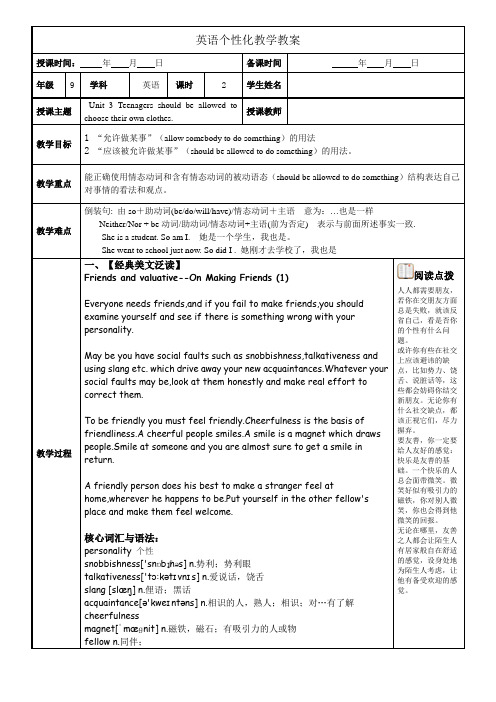
阅读点拨小提示参考答案:Ⅰ.A.1.allowed 2. silly 3. chats 4. volunteer 5. piercedB.1.pay attention to 2. given up 3. stayed up 4. is interested in 5. chats with ]Ⅱ.A.1—5:ACBBB 6—10:CCCBCB:1.be allowed 2. is cleaned 3. was given to 4. spent on 5. will be publishedC:1.get their ears pierced 2. proud of 3. had no opportunity 4.concentrate on 5. are strict withunit3pierce/piəs/v. 刺穿,刺破license/'laisəns/n. 执照;许可证silly/'sili/a. 愚蠢的;傻的earring/'iəriŋ/n. 耳环instead of代替;而不是stay up熬夜;不睡觉concentrate/'kɔnsəntreit/v. 集中;聚集concentrate on专心于;全神贯注study/'stʌdi/v. 学习;研究design/di'zain/n. 设计;构思present/'prezənt]n.目前;现在at present目前,现在opportunity/ɔpə'tju:niti/n. 机会;时机volunteer/vɔlən'tiə/n. 志愿者local/'ləukəl/a. 当地的;地方的experience/ik'spiəriəns/n.v.经历;体验member/'membə/n. 成员;会员mess/mes/n. 混乱;脏乱old people's home养老院sleepy/'sli:pi/a.不活跃的;困倦的reply/ri'plai/v. 回答;答复newsletter/'nju:z,letə/n. 时事通讯;简报obey/ə'bei/v. 服从,顺从in the way妨碍人的;挡道的achiev/ə'tʃi:v/vt.实现;完成race/reis/v.赛跑;比赛n.与...比赛;参加赛跑realistic/riə'listik/a. 现实的;注重实际的taught/tɔ:t/v. 教(teach的过去式和过去分词)importance/im'pɔ:təns/n. 重要性care about关心;担心succeed/sək'si:d/vi. 成功point/pɔint/v. 指,指向。
- 1、下载文档前请自行甄别文档内容的完整性,平台不提供额外的编辑、内容补充、找答案等附加服务。
- 2、"仅部分预览"的文档,不可在线预览部分如存在完整性等问题,可反馈申请退款(可完整预览的文档不适用该条件!)。
- 3、如文档侵犯您的权益,请联系客服反馈,我们会尽快为您处理(人工客服工作时间:9:00-18:30)。
Unit 3 Teenagers should be allowed to choose their own clothes.听说课 Section B 1a—2cTeaching goals:Talk about some school rules. Teach the students to obey the rules and understand each other. After leaning, students can talk about their own ideas and be willing to be good students .Teaching Procedures一、Preview:(预习导学)Translate the following phrases:上课迟到_____________________参加考试__________________ 通过考试____________考试不及格 _________________ 对某人严格要求_________________(设计意图:学生独立完成翻译练习,检验学生课前的预习情况。
为新课学习奠定基础,扫清学习障碍。
)二、RevisionShow some photos of my daughter’s activities at home, say something about her . Introduce some family rules that she must obey at home.For example: She has to study on school nights. She is allowed to watch TV after finishing homework on weekends.Then get the students to say some rules in their homes , using “have to ” , “be allowed to ”or.“ be not allowed to ”.(设计意图:用女儿的照片,并介绍她的一些家规,提高学习兴趣,引发他们想表述自己家规的共鸣。
创设人人都想开口说英语,积极用英语思考的良好氛围。
)三、Leading inShow some pictures about school activities on the screen.Ask some students “How often do you do … ? ”Guide them to answer the questions using always / usually / often / sometimes/ never .And show the chart. Make conversations with “Do you ever …” with your partner.For example: A: Do you ever get to school late?B: Yes, I sometimes get to class late. / No, I never get to class late.Then deal with 1a. Listen and circle the things that you hear.设计意图:(通过学生的口头训练,启发学生的思维,并为本节课的教学作好铺垫。
利用多媒体课件中的图示法使学生能更清楚地认识到这些频率副词的区别和用法。
)四、Listening for the general idea .(2a)Play the tape and get students to circle the things in 1a五、Listening for the specific ideas (2b)①Listen again and get them to match the two columns on the screen.Help the students understand the task and make sure they can master the meaning of the phrases on the right. Then play the tape again Give a pause after the crucial sentences to help them get the information they need easily. Ask five students to read the whole sentences to check the answers.②Play the tape for another time and get them to fill in the blanks with the phrases according to the listening material.Dad: _______ ______ _______, Peter?Peter: I think I’m going to _____ a math test, Dad.Dad: You are? Why?Peter: Well, I _______ the bus and I had to _____ ____ ______.Dad: So?Peter: I am not _________to get to class late, and there was a big test today.Dad: And you weren’t allowed to _____ ____ _____?Peter: That’s right. But I know I could ______ _____ ______.Dad: Well, Peter, the school has to have _______, you know.Peter : I know. But I should be allowed to take the test later. It’s not ______.Dad: I agree. Maybe you could _____ _____ the teacher after school.Peter: Yeah. Maybe if I explain what happened, she’ll understand.③Listen and repeat after the tape(设计意图:采取由易到难,循序渐进的方法来训练学生的听力技能,而后通过学生跟听录音的方式促进学生养成良好的朗读习惯,纠正学生的语音和语调。
使学生在今后的学习当中更能适应纯正的英语。
)六、Post-listening activities1.Role play the conversation. One plays as Dad, the other is Peter.2.Groupwork 2c Discuss these statements.Ask the students to read the sample conversation on the screen .Get them to form groups of four and then make similar conversations .3. Discussion.Discuss these statements.①. Students need strict school rules.②. Parents should not be too strict with usGive the students a sample dialog:A: Do you think students need strict school rules?B: Yes. I do. Because they are too young. They need strict rules./ No, I don’t. Because we would feel uncomfortable.A: I agree with you./ I disagree with you.B: Do you think parents…?A: …At last, tell the students to try to understand each other.(设计意图:通过小组活动,培养学生的合作精神和创新能力,巩固学生在本节课中学过的知识,同时也是为了增强学生的学习兴趣,浓厚课堂氛围。
任务设计难度逐渐增加,循序渐进,使学生把所学知识真正运用到实际交际中去。
)Inquiry into knowledge by translation: 翻译探究1.Do you ever worry that you’ll fail a test?在本句中____ 表示考试“不及格”或“不通过”; 相当于not_____, 也可构成 fail in 结构.鲍勃总是考试不及格。
Bob always _________________________.-注意:fail 后也可跟不定式,fail to do sth. 意为“未能做某事”。
我没能赶上早班车。
I failed ___________ (catch) the early bus.2.Strict 是____词,意为“__________”; be strict with sb. 意为“对某人要求严格”,“对某事要求严格”则用 be strict ____ sth.我们必须在学习上严格要求自己。
We must be ______ _______ ourselves ______ study.当堂检测 :Ⅰ.翻译句子1.I’m sorry I have _____ _____ _______ _______.(英语考试不及格)2.I’m sure I _______ _______ (能通过)the math test.3.Are you going to _______ ______ _____ _______(参加数学考试)?4.When did you ______ ______ (读完)this book ?5.Don’t _______ ________ (担心)him. He is not a child.Ⅱ.用括号内所给词的适当形式填空:1.We _________ (allow) to go to the movies on Friday nights.2.Books can_____________ (not take) out of the reading-room.3.All the work must ___________ (finish) before Wednesday.4.The boy can ________ (take) good care of in this hospital.5.The cat must _________ (kill) by somebody .教学反思:在设计任务型教学活动时以学生的真实生活和兴趣为焦点话题,学生易理解掌握;通过活动让学生习得英语语言知识、发展学生的语言技能;口语练习时尽量创造机会,促使学生主动获取、处理和使用信息,提高用英语解决实际问题的能力。
